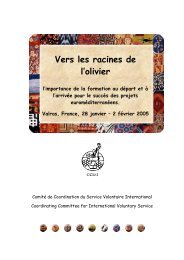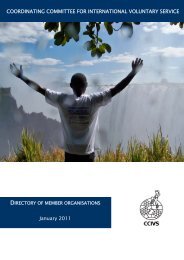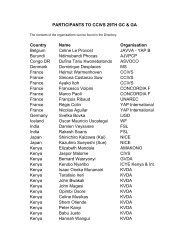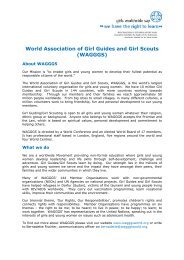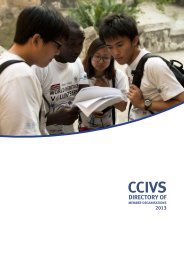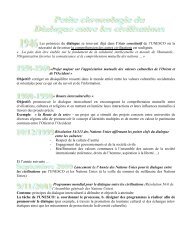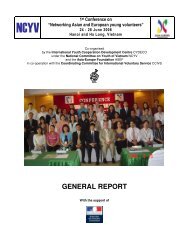Report of the Seminar 2005 - CCIVS
Report of the Seminar 2005 - CCIVS
Report of the Seminar 2005 - CCIVS
Create successful ePaper yourself
Turn your PDF publications into a flip-book with our unique Google optimized e-Paper software.
EU-LA <strong>Seminar</strong><br />
3. Content <strong>of</strong> <strong>the</strong> seminar<br />
Local organisation.<br />
Brigada de Voluntarios Bolivarianos del Peru provided an incredible<br />
logistical support. They organised all <strong>the</strong> transport arrangements from<br />
<strong>the</strong> airport to <strong>the</strong> venue and dispatched volunteers for <strong>the</strong> computer<br />
system, medical care, child care, <strong>the</strong> logistics <strong>of</strong> <strong>the</strong> meeting rooms and<br />
any o<strong>the</strong>r need related to <strong>the</strong> seminar. Apart from <strong>the</strong> investment in<br />
terms <strong>of</strong> energy <strong>the</strong> BVBP also contributed considerably with <strong>the</strong>ir own<br />
resources to <strong>the</strong> event. The venue was simple, convenient, clean with<br />
very big outside spaces.<br />
Working methods.<br />
The project design was inspired by <strong>the</strong> results <strong>of</strong> a seminar run by <strong>CCIVS</strong> with <strong>the</strong> support <strong>of</strong> <strong>the</strong><br />
YOUTH program in 2003 and <strong>the</strong> concrete content was elaborated through a prep team meeting in<br />
February <strong>2005</strong> with several member organizations. The working methods were as interactive as<br />
possible. Given <strong>the</strong>ir pr<strong>of</strong>iles <strong>the</strong> participants were asked to take over many responisibilities in <strong>the</strong><br />
organization <strong>of</strong> <strong>the</strong> seminar. Plenary sessions and working groups were alternated, many energizers<br />
introduced by <strong>the</strong> participants were used. The language <strong>of</strong> <strong>the</strong> seminar was Spanish given <strong>the</strong><br />
language capacities <strong>of</strong> all participants, “ear – to ear” translation for <strong>the</strong> two non Spanish speakers<br />
was organized on a rotating basis by some <strong>of</strong> <strong>the</strong> o<strong>the</strong>r participants. The general working method<br />
was to lead <strong>the</strong> participants from <strong>the</strong> more general issues, providing overviews and backgrounds, to<br />
<strong>the</strong> more specific ones concerning <strong>the</strong> concrete co-operation among <strong>the</strong> organizations present and<br />
beyond. Information about <strong>the</strong> YOUTH program was a permanent feature on <strong>the</strong> agenda.<br />
Expectations.<br />
The main concerns <strong>of</strong> <strong>the</strong> participants can be summarised as such:<br />
• Building up new partnerships.<br />
• Development <strong>of</strong> workcamps among <strong>the</strong> organizations<br />
• Sharing experiences and challenges.<br />
• Set a Latin American network with its specific vision and goals in order to negotiate with<br />
European network ie.<br />
1) Review <strong>the</strong> relationship with Europe regarding historical and cultural aspects as how it used to<br />
be, how it is nowadays and how we want it to be from now on; <strong>the</strong> social service put in <strong>the</strong><br />
framework <strong>of</strong> this political perspective;<br />
2) How <strong>the</strong> get funds from institutions abroad.<br />
• To re-enforce <strong>the</strong> perspective <strong>of</strong> <strong>the</strong> intercultural education during <strong>the</strong> development <strong>of</strong><br />
workcamps or volunteers among networks: education on values and <strong>the</strong> service as an excuse to<br />
educate better human beings. How intercultural approach should be between <strong>the</strong> European Union<br />
and Latin America. More knowledge and information about both realities. Streng<strong>the</strong>n <strong>of</strong> <strong>the</strong><br />
commitments <strong>of</strong> <strong>the</strong> volunteers (not just as alternative tourism or cheap vacations). Put <strong>the</strong><br />
encounter between Latinos and Europeans in <strong>the</strong> whole history among <strong>the</strong> two continents.<br />
• To know better how <strong>the</strong> volunteers are trained before coming to Latin America: discuss <strong>the</strong><br />
methodologies implemented by <strong>the</strong> networks. Improvement <strong>of</strong> <strong>the</strong> selection process.<br />
• Development <strong>of</strong> better communication among institutions.<br />
• Visa for volunteers needed.<br />
6



